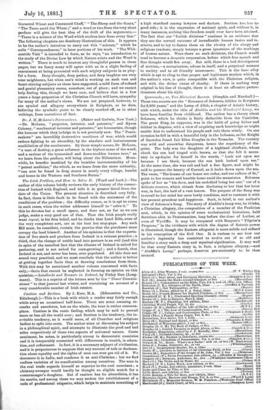Castism and Sectism. By J. Kerr, M.A. (Edmonston and Co.,
Edinburgh.)—This is a book with which a reader may fairly enough svhile away an occasional half-hour. There are some amusing re- marks and anecdotes, but on the whole, the tone is rather common- place. Castism is the caste feeling, which may be said to prevail more or less all the world over ; and Sectism is the tendency, the in- evitable tendency, as it would seem, of all Churches and religious bodies to split into sects. The author aims at discussing his subject in a philosophical spirit, and attempts to illustrate the good and bad sides respectively of these two aspects of universal nature. Caste sentiment, he notes, is particularly strong in democratic countries and it is inseparably connected with differences in wealth, in educa- tion, and refinement. In fact, it is a necessary adjunct of civilisation, and it is preposterous to suppose that any amount of talk or declama- tion about equality and the rights of man can ever get rid of it. We denounce it in India, and condemn it as anti-Christian ; but we find endless varieties of its manifestation among ourselves. The man in the coal trade regards himself as superior to the coal merchant ; a chimney-sweeper would hardly be thought an eligible match for a costermonger's daughter. But if castism has its absurdities, it has its merits, and among these we may reckon the establishment of a code of professional etiquette, which helps to maintain something of a high standard among lawyers and doctors. Sectism, too, has its good side ; it is the expression of national spirit, and without it, in many instances, nothing like freedom could ever have been attained. The fact that our "foolish divisions" continue is an evidence that they are the normal outcome of ineradicable human tastes and in- stincts, and to try to fasten them on the rivalry of the clergy and religious teachers, simply betrays a gross ignorance of the workings of human nature. Were there no such divisions, the Church would tend to become a despotic corporation, before which free speech and free thought would flee away. But still, there is a bad development of sectism,—a sectarianism, odious in itself, and a perpetual menace to society and to all friendly intercourse. This is the base alloy which is apt to cling to that proper and legitimate sectism which, in the author's view, is quite compatible with the Christian religion, and with the divine virtue of charity. If there is nothing very original in his line of thought, there is at least no offensive preten- tiousness about his style.


































 Previous page
Previous page